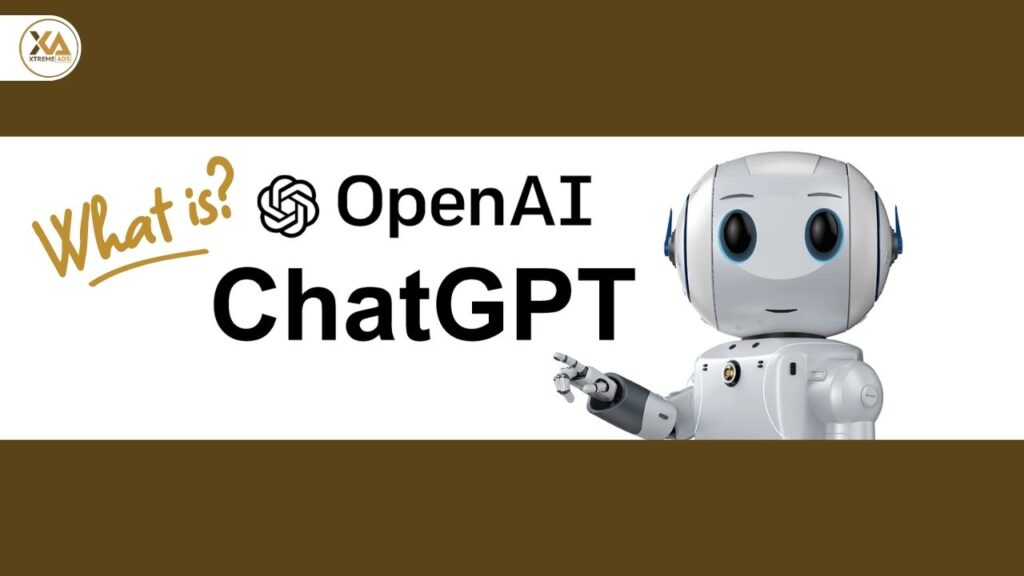OpenAI introduced a long-form question-answering AI called ChatGPT that answers complex questions conversationally.
It’s a revolutionary technology because it’s trained to learn what humans mean when they ask a question.
What Is ChatGPT?
ChatGPT is a large language model chatbot developed by OpenAI based on GPT-3.5. It has a remarkable ability to interact in conversational dialogue form and provide responses that can appear surprisingly human.
Large language models perform the task of predicting the next word in a series of words.
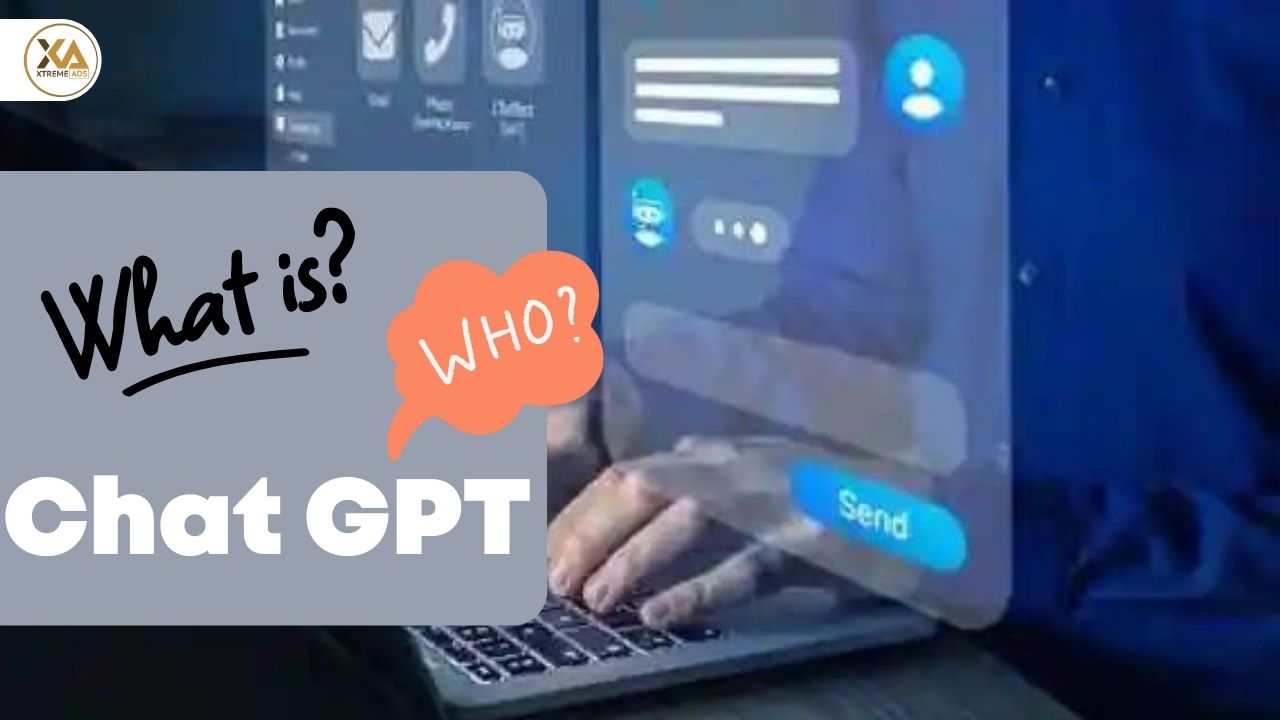
Who Built ChatGPT?
ChatGPT was created by San Francisco-based artificial intelligence company OpenAI. OpenAI Inc. is the non-profit parent company of the for-profit OpenAI LP.
OpenAI is famous for its well-known DALL·E, a deep-learning model that generates images from text instructions called prompts.
The CEO is Sam Altman, who previously was president of Y Combinator.
Large Language Models
ChatGPT is a large language model (LLM). Large Language Models (LLMs) are trained with massive amounts of data to accurately predict what word comes next in a sentence.
It was discovered that increasing the amount of data increased the ability of the language models to do more.
Here are five ChatGPT examples and useful ways SEO professionals and marketers can use it for daily marketing tasks.
#1 Compose Regular Expressions In Analytics Reporting
Regular expressions can be used in composing analytic reports such as Google Search Console or Google Analytics. Regular expressions are one of the most boring tasks we know, and it may really slow down work. For marketers, it is even tougher, as they don’t have a technical background.
Let’s look at an example of GSC’s reporting !
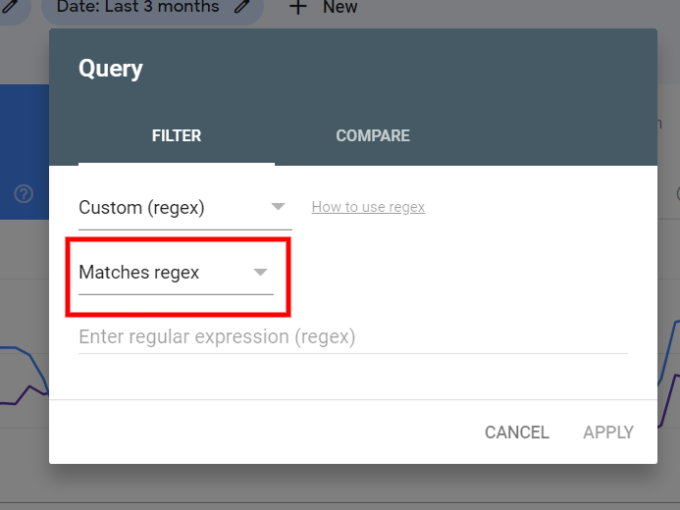
If you are a marketer with no technical background, you may find it hard to use this feature and limit yourself to the few basic regexps which you can find by searching dev-related forums.
Now you have ChatGPT at your disposal!
Just go to ChatGPT and ask: “compose regular expression which starts with “How To” or “What is” case insensitive using RE2 syntax ”
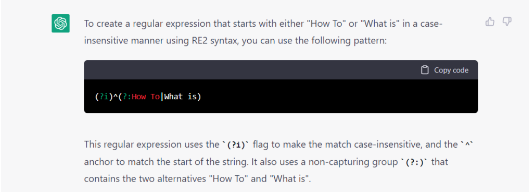
(?i)^(?:How To|What is)It got the job done instantly. Just copy and paste in the GSC’s filter field, and you will have all the queries which are candidates to optimize for FAQ or How to schema.
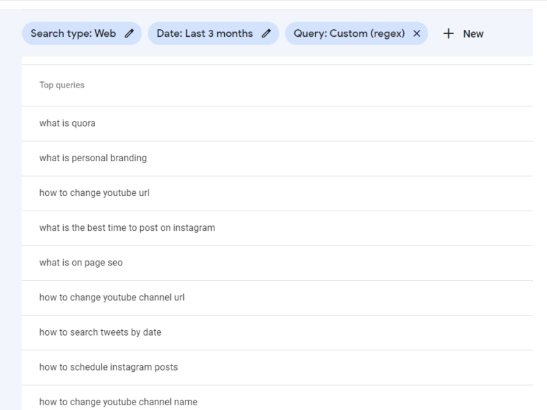
You can use it to compose regexp for GA reports as well. For example, let’s say you want to filter a report which has in the URL words “Samsung” and “iphone”. Just ask ChatGPT “compose regular expression which contains words “Samsung” and “iphone” case insensitive using RE2 syntax ”.
Just to note, it is important to mention “RE2 syntax” in the command, as Google’s reporting dashboards support that syntax.
#2 Compose Complex Spreadsheet Formulas
Everyone works with Excel or Google Sheets. It is in everyone’s daily work life, and you know how it is sometimes tough to compose spreadsheet formulas as you must do research to find the function name you need and then spend 10-15 mins in figuring out how to make it work.
Now it just takes you to ask ChatGPT a command like: “Google Sheet formula which copies all rows from sheet1 where column "A" contains word "iphone"“.
And it didn’t take long to get the solution.
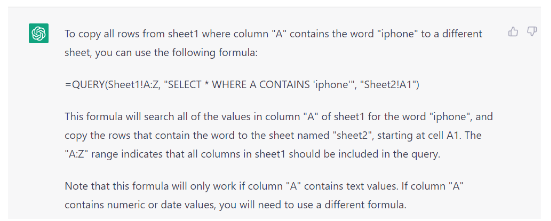
But, the formula it gave =QUERY(Sheet1!A:Z, "SELECT * WHERE A CONTAINS 'iphone'", "Sheet2!A1") has a small error. Of course, ChatGPT doesn’t always provide 100% correct answers. You should sometimes check and fix it manually. The formula I got is 99% correct, except the third parameter shouldn’t be there. So we removed it manually and now have =QUERY(Sheet1!A:Z, "SELECT * WHERE A CONTAINS 'iphone'") which works perfectly!
#3 Setup Custom Pixel Conversions
If you are a PPC marketer or an SEO expert who wants to set up custom conversions when users perform certain actions on the website but don’t have a web developer’s help, it could be quite challenging in some situations. Yes, you can use Google Tag Manager in many cases when users click on the link, but you could need something different, which is not a built-in feature of GTM.
For example, you need to send a conversion event when one lands on your landing page and scrolls through 35% of the page. Now you don’t need to hire a developer to get the job done. Just go to ChatGPT and ask: “send Facebook pixel custom conversion event once as users scroll through 35% of the page using JavaScript” and it will do the magic!
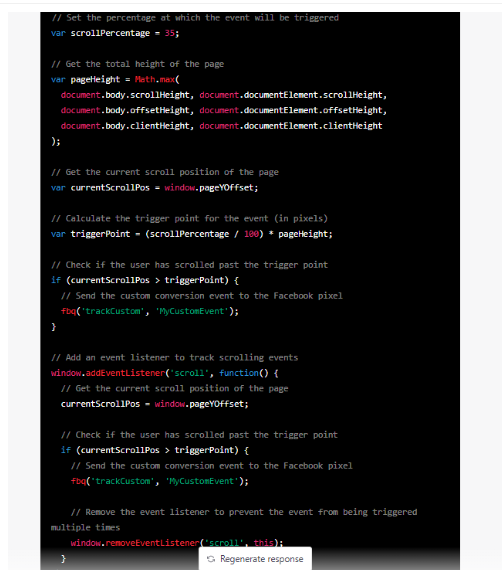
You can copy and paste this code in your <head> tag of HTML, and you are done. If you have a WordPress site, you can use plugins such WPCode to make the job easier. Alternatively, you can use Google Tag Manager custom HTML tag to add your JavaScript code there.
#4 Optimize FAQ and Featured Snippets
SEO professionals may need help getting related questions from users to optimize content for a specific keyword. You can use ChatGPT to get these related questions to make your content more helpful. If you have a travel blog, you may ask: related questions regarding "cozy cities in Germany" and ChatGPT will draw many queries which really make sense.
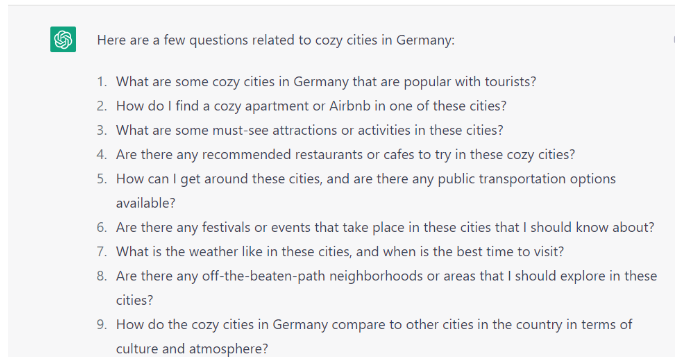
Of course, there may be ones that don’t make sense, but they will do 90% of the job. The questions it suggests may not have any search volume, but it is still worth going after them because zero-search volume keywords may drive significant traffic.
#5 Fetch Data from APIs and Coding
Let’s say you have a WooCommerce Store and want to fetch all products you have with their prices into a Google Sheet. Now you can simply ask: “google app script which fetches all product names and prices from WooCommerce REST API and adds into a spreadsheet” and you are done.
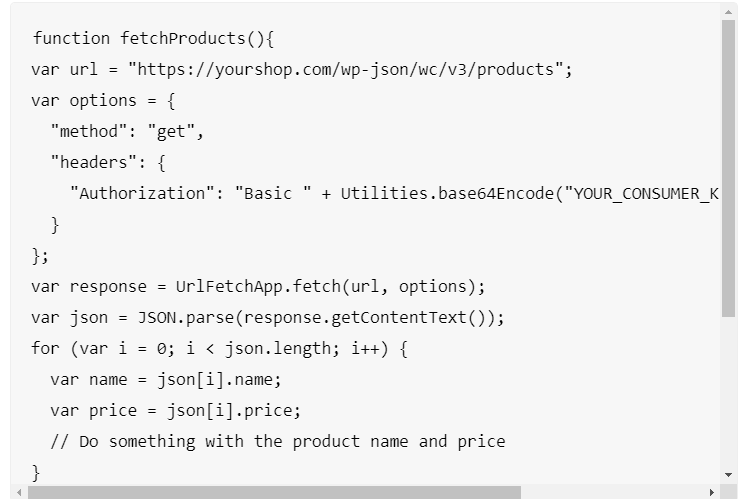
It sometimes may give a code with a small error that you need to fix manually, like in the above example of the Google Spreadsheet formula.
The coding ability of ChatGPT is going to be especially useful when working with Zapier. If you have ever used Zapier, you know it has a Zap called “code,” which is for advanced users. If you have data in a certain ugly format that needs to be fixed now, you can just ask ChatGPT to fix it, and use it in Zapier custom code to clean up the data.
To Wrap up
There are talks that ChatGPT is going to replace humans, and many professions are just going to die out. In my personal opinion, it will not happen, but it will make life easier in different industries and professional fields Like SEO.


